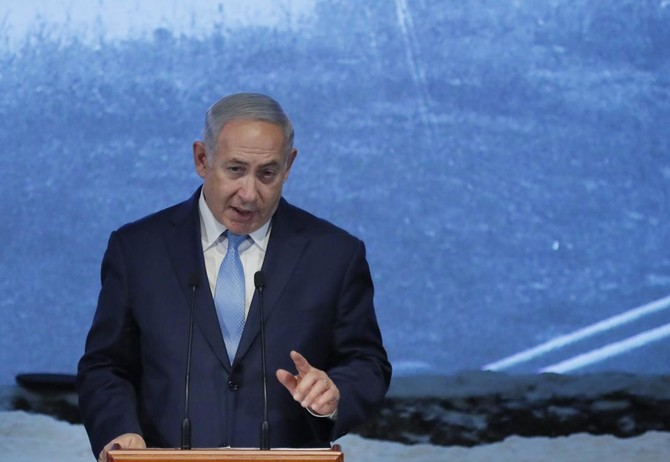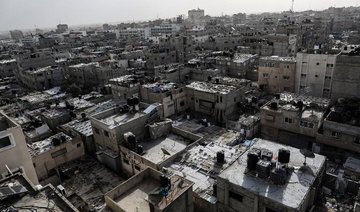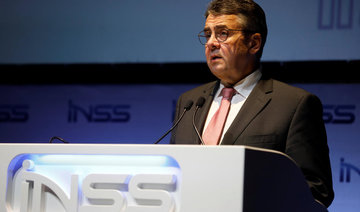JERUSALEM: Prime Minister Benjamin Netanyahu on Wednesday said Israel will retain security control over the Palestinians as part of any future peace deal, deepening Palestinian fears that Israel and the Trump administration are colluding on a proposal that will fall far short of their dreams of independence.
Netanyahu’s statement exposed a deepening rift that has emerged between the US and Israel on one hand, and the Palestinians and the Europeans on the other, ahead of an expected peace push by the Trump administration. Those disagreements could complicate things for the US team.
Since taking office, President Donald Trump has distanced himself somewhat from the two-state solution — the outcome favored by the international community, including Trump’s predecessors, for the past two decades.
Instead, he has said he would support Palestinian independence only if Israel agrees. The European Union, meanwhile, along with the rest of the international community, remains committed to the two-state solution.
These differences were evident at a meeting Wednesday between Netanyahu and the German foreign minister, Sigmar Gabriel.
In an awkward exchange, Gabriel said his country is “very much in favor” of the two-state solution.
“I was very thankful to hear that of course also the government of Israel wants to have two states, but (with secure) borders,” he said.
Netanyahu broke in with a clarification.
He said Israel’s “first condition,” would be to control security west of the Jordan River, an area that includes all of the West Bank, the heartland of the Palestinians’ hoped-for state.
“Whether or not it is defined as a state when we have the military control is another matter,” he said. “I’d rather not discuss labels, but substance.”
That suggests Israel would prefer something most observers would more likely define as autonomy than independence — an arrangement that would have few if any equivalents in the world.
The Palestinians claim all of the West Bank, east Jerusalem and the Gaza Strip, areas captured by Israel in 1967, for their state. Israel withdrew from Gaza in 2005, but it has settled over 600,000 people in the West Bank and east Jerusalem, making it increasingly difficult to partition the land.
Nabil Abu Rdeneh, spokesman for Palestinian President Mahmoud Abbas, said the Palestinians would not accept the presence of “one Israeli soldier” on sovereign Palestinian lands.
“Either there will be full Palestinian sovereignty or there will be no security, no peace and no stability,” he said.
Advocates of the two-state solution, including Israel’s opposition parties, have long argued that the establishment of a Palestinian state is essential for Israel’s own survival. Without a Palestinian state, they say that the number of Jews and Arabs under Israeli control will be roughly equal.
Israel would then have to choose between granting millions of Palestinians citizenship, threatening the country’s status as a Jewish-majority democracy, or turning into an apartheid-like state where Jews and Palestinians have different sets of rights.
It is far from certain that Netanyahu’s envisioned solution would ease international concerns over Israel’s half-century occupation over the Palestinians.
The Palestinians have long been suspicious of Trump’s Mideast team, led by his son-in-law Jared Kushner, due to their deep connections to Israel and years of support to the West Bank settlement movement.
Those suspicions deepened after Trump recognized Jerusalem as Israel’s capital last month. The Palestinians accused Trump of siding with Israel and said they would no longer accept the US as a mediator.
Palestinian officials now claim that Trump’s team is working with Israel on a plan that would give them a mini-state in roughly half of the West Bank, with Israel retaining overall security control, as well as control over Jerusalem and its holy sites. Final borders and the fate of Israel’s dozens of settlements would be decided later. The officials say a third country with close ties to the US recently presented details of the proposal.
When they tried to negotiate improvements, they say they were told it was a “take it or leave it” plan. The officials spoke on condition of anonymity because they were discussing a classified diplomatic issue.
The White House did not immediately respond to a request for comment. Officials have said recently that the White House is still working on its proposal, and have refused to say when it might be unveiled.
On Wednesday, European officials urged the administration not to go it alone.
“Any framework for negotiations must be multilateral and must involve all players,” EU foreign policy chief Federica Mogherini said in Brussels. “Nothing without the United States, nothing with the United States alone.”
At an academic conference in Tel Aviv, Gabriel, the German foreign minister, expressed grave concern for Israel’s future, saying the government’s ambivalence toward a Palestinian state showed a lack of direction and suggesting that Trump’s unflinching support wasn’t necessarily in Israel’s best interest.
Gabriel said that in Europe “there is clearly growing frustration with Israel’s actions,” and asked Israelis: “How do you want Israel’s future to look like? Are you prepared to pay the price of perpetual occupation?“
Israel vows to retain West Bank control in any peace deal
Israel vows to retain West Bank control in any peace deal

Israel-backed aid organization in Gaza says 20 killed at distribution site, mostly in stampede

- The Gaza Humanitarian Fund said 19 people were trampled in a stampede and one person was fatally stabbed
TEL AVIV: An Israeli-backed American organization that runs an aid program in the Gaza Strip said Wednesday 20 Palestinians were killed near a distribution site. This comes as Israeli strikes killed 22 others, including 11 children, according to hospital officials.
The Gaza Humanitarian Fund said 19 people were trampled in a stampede and one person was fatally stabbed in the violence near a distribution hub in the southern Gaza city of Khan Younis.
The group, which rarely acknowledges trouble at its distribution sites, accused Hamas of fomenting panic and spreading misinformation that led to the violence, though it provided no evidence to support the claim.
Clashes resume in Syria’s Druze city of Sweida, Israel vows more strikes

- Katz also said the Syrian government should “leave Druze alone” following recent clashes in Sweida
DAMASCUS: Clashes between Syrian government troops and local Druze fighters resumed in the southern Druze city of Sweida early on Wednesday, collapsing a ceasefire announced just hours earlier that aimed to put an end to days of deadly sectarian bloodshed.
The outbreak of violence in the predominantly Druze province in southern Syria has highlighted frictions among Syria’s diverse communities, with minorities feeling deep distrust toward the Islamist-led government now in power.
Syrian troops were dispatched to the province on Monday to quell fighting between Druze fighters and Bedouin armed men but ended up clashing with the Druze militias. The fighting drew in Israel, which carried out air strikes on government forces on Monday and Tuesday under the aim of protecting the Druze.
A ceasefire announced by Syria’s defense ministry on Tuesday night was short-lived.
Local news outlet Sweida24 said the city of Sweida and nearby villages were coming under heavy artillery and mortar fire early on Wednesday. Syria’s defense ministry, in a statement carried by state news agency SANA, blamed outlaw groups in Sweida for breaching the truce.
The defense ministry called on residents of the city to stay indoors.
Dozens of civilians, government troops and Druze fighters have been killed since the fighting erupted on Sunday.
Civilians and Reuters reporters in the city said that government forces had looted and burned homes, stealing cars and furniture from homes on Tuesday. One man showed a Reuters reporter the body of his brother, who had been shot in the head inside their home.
Israel’s Defense Minister Israel Katz on Wednesday warned the Syrian government to “leave Druze alone” and that the military would continue to strike Syrian government forces until they pulled back.
US Syria envoy Tom Barrack said on Tuesday that the United States was in contact with all sides “to navigate toward calm and integration.”
Iran seizes foreign tanker for smuggling 2 million liters of fuel

- The judiciary official added that 17 crew members were arrested
DUBAI: A foreign tanker was seized by Iran in the Gulf of Oman for smuggling 2 million liters of fuel, the chief justice of Hormozgan province said on Wednesday, according to Iran’s semi-official Mehr news agency.
“During the continuous process of monitoring and surveilling suspicious fuel smuggling movements in the Gulf of Oman, officers inspected a foreign tanker due to its lack of legal documents regarding its cargo and seized it on charges of carrying 2 million liters of smuggled fuel,” Hormozgan’s Chief Justice Mojtaba Ghahremani said, according to the report.
The judiciary official added that 17 crew members were arrested and that a judicial case was opened at the Jask county prosecutor’s office.
There was no additional information regarding the name of the tanker or the flag to which it is registered.
Iran, which has some of the world’s lowest fuel prices due to heavy subsidies and the plunge in the value of its national currency, has been fighting rampant fuel smuggling by land to neighboring countries and by sea to Gulf Arab states.
“The actions of fuel smugglers, who in coordination with foreigners, attempt to plunder national wealth will not remain hidden from the judiciary and punishment of perpetrators, if their crimes are proven, will be without leniency,” Ghahremani said, according to the report.
Syria announces ceasefire after sectarian clashes, but more fighting and abuse alleged

- Tuesday’s announcement follows deadly sectarian clashes between Druze factions and Sunni Bedouin tribes that killed over 30 people
- That’s according to Syria’s Interior Ministry. However, fighting and allegations of civilian abuses by security forces continue
BUSRA AL-HARIR: Syria ‘s defense minister announced a ceasefire shortly after government forces entered a key city in southern Sweida province on Tuesday, a day after sectarian clashes killed dozens there. Neighboring Israel again launched strikes on Syrian military forces, saying it was protecting the Druze minority.
The latest escalation under Syria’s new leaders began with tit-for-tat kidnappings and attacks between local Sunni Bedouin tribes and Druze armed factions in the southern province, a center of the Druze community.
Syrian government forces, sent to restore order on Monday, also clashed with Druze armed groups.
A ceasefire announcement
On Tuesday, Syrian Defense Minister Murhaf Abu Qasra said an agreement was struck with the city’s “notables and dignitaries” and that government forces would “respond only to the sources of fire and deal with any targeting by outlaw groups.”
However, scattered clashes continued after his announcement — as did allegations that security forces had committed violations against civilians.
Syria’s Interior Ministry said Monday that more than 30 people had been killed, but has not updated the figures since. The Syrian Observatory for Human Rights, a UK-based war monitor, said Tuesday that 166 people had been killed since Sunday, including five women and two children.
Among them were 21 people killed in “field executions” by government forces, including 12 men in a rest house in the city of Sweida, it said. It did not say how many of the dead were civilians and also cited reports of members of the security forces looting and setting homes on fire.
Syrian interim President Ahmad Al-Sharaa said in a statement that he had tasked authorities with “taking immediate legal action against anyone proven to have committed a transgression or abuse, regardless of their rank or position.”
Associated Press journalists in Sweida province saw forces at a government checkpoint searching cars and confiscating suspected stolen goods from both civilians and soldiers.
Israel’s involvement draws pushback
Israeli airstrikes targeted government forces’ convoys heading into the provincial capital of Sweida and in other areas of southern Syria.
Israeli Prime Minister Benjamin Netanyahu and Defense Minister Israel Katz said the strikes sought to “prevent the Syrian regime from harming” the Druze religious minority “and to ensure disarmament in the area adjacent to our borders with Syria.” In Israel, the Druze are seen as a loyal minority and often serve in the armed forces.
Meanwhile, Israeli Cabinet member and Minister of Diaspora Affairs Amichai Chikli called on X for Al-Sharaa to be “eliminated without delay.”
A soldier’s story
Manhal Yasser Al-Gor, of the Interior Ministry forces, was being treated for shrapnel wounds at a local hospital after an Israeli strike hit his convoy.
‘We were entering Sweida to secure the civilians and prevent looting. I was on an armored personnel carrier when the Israeli drone hit us,” he said, adding that there were “many casualties.”
The Syrian Foreign Ministry said Israeli strikes had killed “several innocent civilians” as well as soldiers, and called them “a reprehensible example of ongoing aggression and external interference” in Syria’s internal matters.
It said the Syrian state is committed to protecting the Druze, “who form an integral part of the national identity and united Syrian social fabric.”
Suspicion over Syria’s new government
Israel has taken an aggressive stance toward Syria’s new leaders since Al-Sharaa’s Sunni Islamist insurgents ousted former President Bashar Assad in December, saying it doesn’t want militants near its borders. Israeli forces have seized a UN-patrolled buffer zone on Syrian territory along the border with the Golan Heights and launched hundreds of airstrikes on military sites in Syria.
Earlier Tuesday, religious leaders of the Druze community in Syria called for armed factions that have been clashing with government forces to surrender their weapons and cooperate with authorities. One of the main Druze spiritual leaders later released a video statement retracting the call.
Sheikh Hikmat Al-Hijri, who has been opposed to the government in Damascus, said in the video that the initial Druze leaders’ statement had been issued after an agreement with the authorities in Damascus but that “they broke the promise and continued the indiscriminate shelling of unarmed civilians.”
“We are being subjected to a total war of annihilation,” he claimed, without offering evidence.
Some videos on social media showed armed fighters with Druze captives, beating them and, in some cases, forcibly shaving men’s moustaches.
Sectarian and revenge attacks
The Druze religious sect began as a 10th-century offshoot of Ismailism, a branch of Shiite Islam. More than half the roughly 1 million Druze worldwide live in Syria. Most of the other Druze live in Lebanon and Israel, including in the Golan Heights, which Israel captured from Syria in the 1967 Mideast War and annexed in 1981.
Since Assad’s fall, clashes have broken out several times between forces loyal to the new Syrian government and Druze fighters.
The latest fighting has raised fears of more sectarian violence. In March, an ambush on government forces by Assad loyalists in another part of Syria triggered days of sectarian and revenge attacks. Hundreds of civilians were killed, most of them members of Assad’s minority Alawite sect. A commission was formed to investigate the attacks but no findings have been made public.
The videos and reports of soldiers’ violations spurred outrage and protests by Druze communities in neighboring Lebanon, northern Israel and in the Israel-annexed Golan Heights, where the Israeli military said dozens of protesters had crossed the border into Syrian territory.
The violence drew international concern. The US envoy to Syria, Tom Barrack, called the violence “worrisome on all sides” in a post on.
“We are attempting to come to a peaceful, inclusive outcome for Druze, Bedouin tribes, the Syrian government and Israeli forces,” he said.
UN says 875 Palestinians have been killed near Gaza aid sites

- The United Nations has called the GHF aid model “inherently unsafe” and a violation of humanitarian impartiality standards
GENEVA: The UN rights office said on Tuesday it had recorded at least 875 killings within the past six weeks at aid points in Gaza run by the US- and Israeli-backed Gaza Humanitarian Foundation and convoys run by other relief groups, including the United Nations.
The majority of those killed were in the vicinity of Gaza Humanitarian Foundation sites, while the remaining 201 were killed on the routes of other aid convoys.
The GHF uses private US security and logistics companies to get supplies into Gaza, largely bypassing a UN-led system that Israel alleges has let Hamas-led militants loot aid shipments intended for civilians. Hamas denies the allegation.
The GHF, which began distributing food packages in Gaza in late May after Israel lifted an 11-week aid blockade, previously told Reuters that such incidents have not occurred on its sites and accused the UN of misinformation, which it denies.
The GHF did not immediately respond to a request for comment on the latest UN figures.
“The data we have is based on our own information gathering through various reliable sources, including medical human rights and humanitarian organizations,” Thameen Al-Kheetan, a spokesperson for the UN Office of the High Commissioner for Human Rights, told reporters in Geneva.
The United Nations has called the GHF aid model “inherently unsafe” and a violation of humanitarian impartiality standards.
The GHF said on Tuesday it had delivered more than 75 million meals to Gaza Palestinians since the end of May, and that other humanitarian groups had “nearly all of their aid looted” by Hamas or criminal gangs.
The Israeli army previously told Reuters in a statement that it was reviewing recent mass casualties and that it had sought to minimize friction between Palestinians and the Israel Defense Forces by installing fences and signs and opening additional routes.
The UN Office for the Coordination of Humanitarian Affairs has previously cited instances of violent pillaging of aid, and the UN World Food Programme said last week that most trucks carrying food assistance into Gaza had been intercepted by “hungry civilian communities.”




















